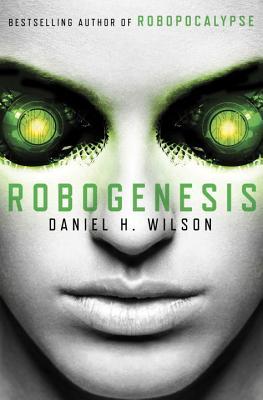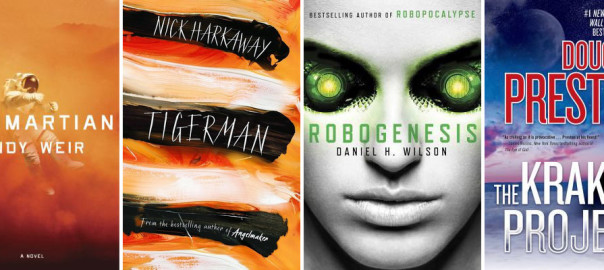I’ve been having a good run in the books I’ve been reading recently. In fact, the best run I can remember, with some books which I’ve found truly memorable, so I thought I’d share some thoughts here.
 The Martian by Andy Weir
The Martian by Andy Weir
★★★★★
The premise of The Martian is pretty straight-forward – astronaut Mark Watney gets stranded on Mars and must devise a way to survive. The book is effectively survival sci-fi, but seems so grounded and researched it reads like a non-fiction thriller. Maybe I lack the background in space exploration to find faults with the technical descriptions, but it all sounds so right. I read it in about two days.
One of the criticisms that has been levelled at the novel is that it is too descriptive in outlining how Watney solves each of the problems he faces. Yet as an engineer, I found it utterly fascinating.
The other bit of criticism that readers have is that there’s not enough depth to the characters. This is perhaps fair, but it’s hard to fault a novel so compelling and well-paced – it just isn’t missed. It spans a long period of time, and has enough wit and geeky references to allow the reader to connect with the character in a different way.
I’m in no way surprised to hear that a film adaptation is already in the works, and I’ve already added Andy Weir to the list of authors I follow closely.
 Tigerman by Nick Harkaway
Tigerman by Nick Harkaway
★★★★★
Nick Harkaway’s latest is, without a shadow of a doubt, his best yet. Set on the fictional island of Mancreu, a sergeant of the British Army quietly serves out his time until an explosion of violence changes things.
Like his previous novel Angelmaker, Tigerman is set in what feels like a slightly warped reality. It could be our world if a butterfly had flapped its wings 500 years ago. The island of Mancreu is a character in itself, and I felt it apt the name had a ring of The Island of Doctor Moreau.
Having said that, the novel defies categorisation. Nick Harkaway himself recently asked on Twitter:
Would be really interested to know how you’d categorise Tigerman. Thriller? Mystery? Comedy? Tragedy? Comic book pastiche? (Work question 🙂
It is all of those. But it is also a political satire, a morality tale, a sentimental and emotional story, a net-speak reference guide, and more. The book is packed with ideas.
As “the boy” would say, it is full of win.
 Robogenesis by Daniel H. Wilson
Robogenesis by Daniel H. Wilson
★★★★★
Robogenesis is the follow up to Robopocalypse. In Robopocalypse humanity fought the machine uprising orchestrated by an escaped artificial intelligence. Look past the cheesy title, and you would have found a hugely entertaining novel without the overly fantastical themes typical of sci-fi involving AI – it all felt plausible. Bizarrely, some accused the book of lacking scope.
It’s unlikely anyone will accuse Robogenesis of lacking scope. This very much feels like an expansion to the world he’s created, with battling AI’s, independently-thinking robots, and human-machine hybrids. Throughout, Daniel H. Wilson’s background in machine learning and robotics is evident. The increasingly wide nature of life described increases organically enough to feel completely authentic.
Robogenesis is definitely one of my books of the year. It is a shining example of how to write a compelling story involving AI. I find it impossible to see how Daniel H. Wilson could improve on Robogenesis, but I’ll be the first in line to read his next offering. Let’s hope Steven Spielberg picks up that Robopocalypse project again…
 The Kraken Project by Douglas Preston
The Kraken Project by Douglas Preston
★☆☆☆☆
Or The End of my Book Streak. Douglas Preston and Lincoln Child’s books are a bit of a guilty pleasure to me, particularly their collaborative Pendergast series – the plot is sometimes daft, and I often have to suspend disbelief, but they’re enjoyable page turners which require little effort to read.
Not so with Douglas Preston’s latest offering. If Robogenesis is an example of how to write about AI, The Kraken Project is an example of how not to write about it. [SPOILERS AHEAD]
The plot: an experimental NASA AI, Dorothy, devised for independent exploration of Titan, escapes onto the Internet. That base is already a little thin, and I would have been able to deal with it were it not for the daftness that follows. Where Daniel H. Wilson’s AI’s look for data centers to increase their computing power, Dorothy jumps from one machine to another, seemingly as at home on a supercomputer as on a laptop. It uses fuzzy logic to transform it’s inputs into a visual representation (how?! why!?), and we’re “treated” to scenes such as Dorothy the AI literally getting raped on the Internet.
The developer responsible for creating Dorothy, Melissa Shepherd (why yes, of course she’s a genius-level beautiful blonde Amazon geek who loves the outdoors) has found a “trick” to stop the AI going crazy, a completely new computing paradigm, which she hasn’t shared with anyone because she’s aiming to make herself rich with it (yes, really). Douglas Preston saves the best for last and only reveals this trick at the end and it is… sleep. That’s right, in order for AI to work, it must sleep, and this is why we’ve had a couple of scenes where Dorothy is tired and has a nap.
I only finished the book because I’d started it, and out of some sense of loyalty to Douglas Preston. Honestly, the book is terrible. The plot, the characters, the dialogue, just everything is bad. Stay away.
